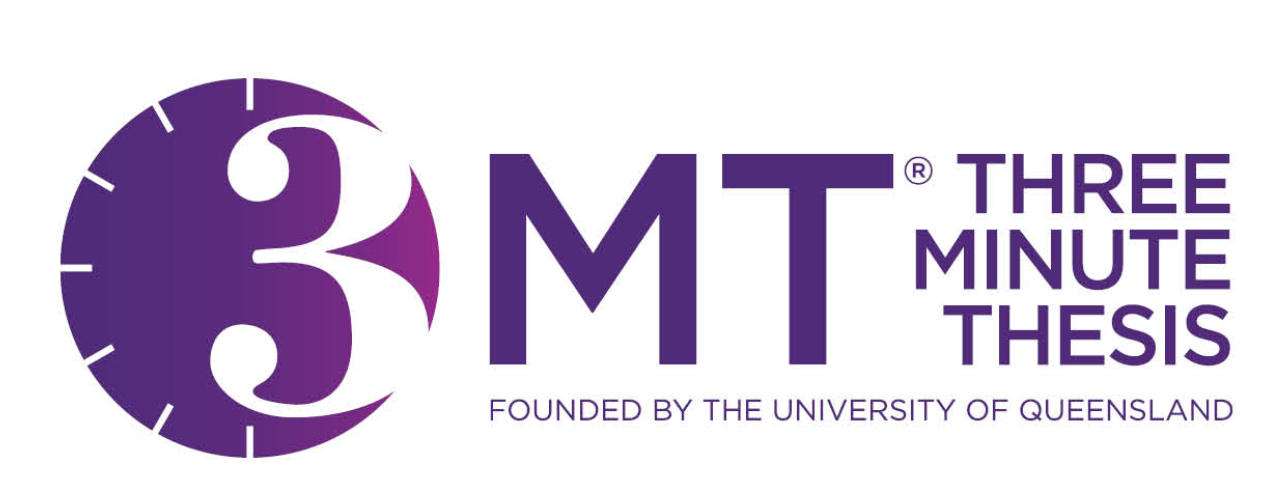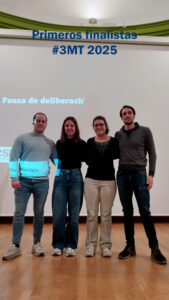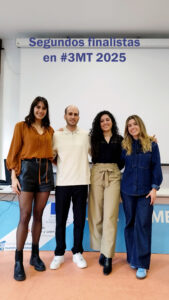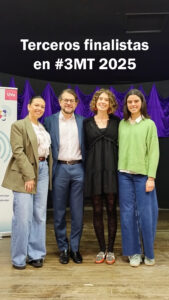Three Minute Thesis (3MT®) is a communication competition for researchers in all areas of knowledge, initiated in 2008 by the University of Queensland in Australia. Today, universities all over the world have adopted this model, which helps to develop the communication skills of pre-doctoral researchers.
This competition challenges students to consolidate their hypotheses, objectives and ideas and the validity and importance of the results, and to present them clearly and concisely, using only the resources of public speaking and rhetoric, essential for their future professional careers.
The Doctoral School (EsDUVa) and the Unit of Scientific Culture and Innovation (UCC+i) co-organise the annual 3MT competition at the University of Valladolid (UVa). Aimed at the training of doctoral students, in addition to financial prizes for research, it offers resources and training activities for participants, encouraging the development of their communication and dissemination skills to serve as a bridge between researchers and the general public.
This competition also aims to promote multidisciplinary exchange, encouraging members of the academic community to learn about the different research projects being carried out by doctoral students at the UVA. In this way, the aim is to create meeting places between different areas of knowledge.
The activity has the collaboration of the Social Council of the University of Valladolid.
Doctoral students have three minutes to present their research topic, their objectives, their hypotheses, or their eventual results. The short time available makes it necessary to prepare clear and effective speeches, which convey in a few words the importance of the research topic and are understandable to both an academic jury and a non-specialist audience. It must be done in Spanish.
Good speech construction and oral presentation are the essential part of the competition, where staging must be kept to a minimum.
The only requirement to participate in the 3MT-2025 is to be enrolled in a UVa doctoral programme in the 2024/2025 academic year and not to have won or been awarded the public prize in any of the previous editions.
- Only a single static PowerPoint slide, without animations or movement, which will be projected from the beginning of the presentation, is allowed.
- The use of additional audiovisual media such as audio or video is not allowed.
- The use of props such as costumes, musical instruments, laboratory equipment, etc. is not allowed.
- Presentations are limited to 3 minutes and those who exceed the time limit will be automatically disqualified.
- Presentations will be spoken (no poems or songs are allowed).
- A presentation is considered to have started when the presenter begins to speak or move.
- The decision of the jury is final and not subject to appeal.
- Tie-breaking criteria. In each qualifying round, the finalists who have obtained the best evaluation by the jury will be selected. In the event of a tie, the tie-breaking criterion will be decided in favour of the candidate with the lowest dispersion of the jury's evaluations. If a tie occurs, the tie-breaker will be decided by public draw. These criteria will also apply to the local final of the competition.
The jury will take into account aspects of the content of the presentations and the communicative ability of the candidates, regardless of the area of knowledge to which their research topics belong.
1. Content
- Has the presentation facilitated understanding of the context of the research topic and its significance?
- Does the presentation follow a clear logical sequence?
- Have the thesis topic, key findings and the significance of the research been communicated in language suitable for a non-specialist audience?
- Has the candidate avoided scientific jargon, explained terminology and given adequate information or examples to illustrate the arguments?
- Has sufficient time been spent on each element of the speech or has any part of the speech been too long, causing the candidate to have to speed through other parts of the presentation?
2. Communication skills
- Has the speech left the jury or the audience wanting to know more about the research topic regardless of the area of knowledge?
- Has the candidate been careful not to trivialise or generalise his/her research?
- Did the researcher convey enthusiasm for his/her thesis topic?
- Did the candidate have sufficient stage presence, eye contact and vocal range, maintain an appropriate stage position, convey confidence and assurance?
- Was the PowerPoint slide suitable for the presentation, did it enhance the presentation, was it clear, legible and concise?
The registration period will be open from February 3 to February 15, 2025 (both inclusive).
The registration form will be sent by e-mail from the Doctoral School to all students.
- First qualifying round. March 31.
- Second qualifying round. April 1.
- Third qualifying round. April 2.
Tuesday, 29 April, 18:00hrs., Academia de Caballería.
First award
Isabel Muñoz de Frutos (PD Física). "Poliespán, poliespán... ¡Qué invento el poliespán!".
Second award
Víctor Manuel Navarro Poncela (PD Filosofía). "El tic-tac silencioso de la educación".
Third award
Alba Torres Arribas (PD Química). "Filtrando el futuro".
Audience award
Sara López Vázquez (PD en Investigación Biomédica). "Madres, no dejéis de brillar".
First qualifying round. Monday 31 March, IES Zorrilla, 09.00hrs.
- Alfredo Acebal
- Claudia Carbayo
- Mónica Muñoz
- A representative from IES Zorrilla
Second qualifying round. Tuesday 1 April, IES La Merced, 09.00hrs.
- Mª Isabel Bravo Arroyo
- Raquel García
- César Sanz
- A representative from IES La Merced
Third qualifying round. Wednesday 2 April, IES Juan de Juni, 09.00hrs.
- Érica Born
- Manuel Conde
- Leonor Revuelta
- A representative from IES Juan de Juni
Final round. Tuesday 29 April, Academia de Caballería de Valladolid, 18.00hrs.
- Tcol. Francisco Javier Calavia
- Luis Nicanor Pablo Díaz
- Eva Moreno
- Angelines Porres
- Fernando del Val
*Listed according to their order of intervention (randomized)
Qualifying rounds
First qualifying round. Monday 31 March. IES Zorrilla, 09:00hrs.
- Ana Ramos Rodríguez (Investigación en Ciencias de la Salud)
- Adrián Martín Gutiérrez (Investigación en Ciencias de la Salud)
- Iván Reyes Rodríguez (Física)
- Olga Barreiro Verea (Conservación y Uso Sostenible de Sistemas Forestales)
- Luis Martín Encinar (Física)
- Lida Mercado Martín (Arquitectura)
- Pablo Jurado Casado (Química, Química de Síntesis, Catálisis y Materiales Avanzados)
- Alba Magarzo Manchón (Conservación y Uso Sostenible de Sistemas Forestales)
- Elisa Ingelmo Astorga (Investigación en Ciencias de la Salud)
- Víctor Manuel Navarro Poncela (Filosofía)
- Teresa Sigüenza Andrés (Ciencia e Ingeniería Agroalimentaria y de Biosistemas)
- Ángela Milagros Reyes Gutiérrez (Economía)
Second qualifying round. Tuesday 1 April. IES La Merced, 09:00hrs.
- Sara Gil Bernabé (Investigación Biomédica)
- Silvia Lahuerta Martín (Investigación en Ciencias de la Salud)
- Manuel Gómez Roux (Conservación y Uso Sostenible de Sistemas Forestales)
- Sara López Vázquez (Investigación Biomédica)
- Alejandro Francisco Vélez Martínez (Europa y el Mundo Atlántico: Poder, Cultura y Sociedad)
- José Ricardo Morán Cabezas (Química)
- Josephine Hermine Houdas (Conservación y Uso Sostenible de Sistemas Forestales)
- María Fernanda Nieto Ramiro (Investigación en Ciencias de la Salud)
- Adrián De la Fuente Ballesteros (Química)
- Isabel Muñoz de Frutos (Física)
- Mauricio Masaru de Souza Ribeiro (Ingeniería Química y Ambiental)
Third qualifying round. Wednesday 2 April. IES Juan de Juni, 09:00hrs.
- Sara Sánchez Sánchez (Estudios Ingleses Avanzados: Lenguas y Culturas en Contacto)
- Diego Guerra Diez (Arquitectura)
- Cristina Valencia Sandonís (Ciencias de la Visión)
- Mario Fernández de la Fuente (Física)
- María Isabel Aliste Herrera (Ciencias de la Visión)
- Irene Alcoceba Herrero (Investigación en Ciencias de la Salud)
- Alba Torres Arribas (Química)
- Rosmeri Martínez Licort (Informática)
- Rafael Liñán Atero (Ciencia e Ingeniería Agroalimentaria y de Biosistemas)
- Alfonso Santos Gargallo (Español: Lingüística, Literatura y Comunicación)
- Celia Sánchez-Girón Coca (Ingeniería Industrial)
Final round
- Teresa Sigüenza Andrés (Ciencia e Ingeniería Agroalimentaria y de Biosistemas)
- Alba Magarzo Manchón (Conservación y Uso Sostenible de Sistemas Forestales)
- Cristina Valencia Sandonís (Ciencias de la Visión)
- Celia Sánchez-Girón Coca (Ingeniería Industrial)
- Alba Torres Arribas (Química)
- Alfonso Santos Gargallo (Español: Lingüística, Literatura y Comunicación)
- Sara López Vázquez (Investigación Biomédica)
- Adrián De la Fuente Ballesteros (Química)
- Pablo Jurado Casado (Química, Química de Síntesis, Catálisis y Materiales Avanzados)
- Isabel Muñoz de Frutos (Física)
- Víctor Manuel Navarro Poncela (Filosofía)
- María Fernanda Nieto Ramiro (Investigación en Ciencias de la Salud)
The participants will be judged by a jury made up of representatives of society in each of the two phases of the competition: preliminary round and the final phase.
Several finalists will be selected in each of the preliminary rounds. During the final phase, the selected participants will be eligible for the following prizes:
- First prize: €1,000
- Second prize: €600
- Third prize: €300
In addition, during the final, an audience prize of €200 will be awarded.
And the other finalists will receive an award of €100.
The 3MT competition has a regional phase in which the finalists of the local phases of the competitions held in the universities of the Region of Castilla y León participate.
The regional final is a proposal of the network of Scientific Culture and Innovation Units of the public universities of Castilla y León in the framework of the University-Business Knowledge Transfer Plan (TCUE) 2024-2027, an initiative of the Regional Ministry of Education with funding from the European Regional Development Fund (ERDF). The activity involves the collaboration of the doctoral schools of the participating universities, as well as the Fundación General Universidad de León y Empresa, the Fundación Universidad de Burgos and the Parque Científico Universidad de Valladolid.
The Three Minutes Thesis competition is being adopted in many countries worldwide. You can consult the updated list of universities with 3MT competitions at the following link https://threeminutethesis.uq.edu.au/participating-institutions



